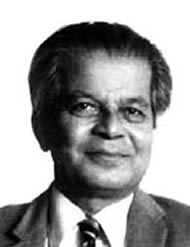Khan, Abdul Majed

Khan, Abdul Majed (1919-1975) researcher and educationist, was born in Kolkata in August 1919. Abdul Majed Khan came from a landed family in the Faridpur district. He passed the Matriculation Examination from faridpur zila school in 1935 and graduated from the presidency college in 1939. In 1942 he took his MA degree in Islamic History and Culture from kolkata university. He obtained the Premchand Roychand Scholarship to conduct his research on Muslims in Medieval Bengal.
In 1943 Abdul Majed was appointed a tutor in the University of Kolkata and the following year a full time lecturer of Islamic History and Culture and an Assistant Superintendent of Carmichael Hostel, Kolkata. In 1944 he was appointed as the first professor of Islamic History and Culture under the Bengal Education Service and posted at Islamia College, Kolkata.
Later on, Abdul Majed Khan joined the Civil Supplies Department and was posted as Controller at Jalpaiguri in West Bengal. After the partition of Bengal (1947), he briefly served in the same post at Gaibandha, Faridpur and Rajbari. In 1950, he moved back to teaching as a senior lecturer in the Department of Islamic History and Culture at Dhaka University.
He took part in the Language Movement of 1952. Majed obtained his PhD from London University in 1966. His thesis titled The Transition in Bengal 1756-1775: A Study of Saiyid Muhammad Reza Khan earned him an instant recognition as a scholar on early colonial history of Bengal.
He took an active part in East Pakistan students’ activities in the UK, including addressing events and meetings in observance of 21st February Bengali Language movement anniversary. He also took part in fundraising for establishing the East Pakistan House in London.
In late 1966 Abdul Majed was offered a position at the History Department of Victoria University, Wellington, New Zealand to teach South Asian History. He established South Asian Studies Centre at the History Faculty of the University.
In 1971, his was the lone Bengali family in New Zealand when crisis brewed in East Pakistan. Immediately he established a first hand contact with Mr Hossain Ali, the newly posted Deputy High Commission in kolkata whom he had known as the Counsellor in Canberra. He took full initiative of liaising with official Bangladesh movement with people and governments of both Australia and New Zealand. He also opened contacts with exiled academics through Professor A R Mullick in Kolkata. Together with all his family members, he worked closely with the Bangladesh Foreign office in Kolkata and was a designated liaison person for the liberation movement in the Far-East and the Pacific.
Majed worked to lobby the New Zealand government and it was no co-incidence that New Zealand was one of the first countries to recognise the newly independent Bangladesh. Majed then focused his attention to the reconstruction needs of the new country.
In mid-1972, Mr Norman Kirk, then leader of the Opposition visited war-ravaged Bangladesh and was moved by its reconstruction needs. On being elected Prime Minister in late 1972, Mr Kirk established a close relationship with Majed. This was followed by massive aid packages, ranging from setting up a dairy farm in Savar with 200 breeding cattle flown from New Zealand, training of over 25 Bangladeshi pilots in New Zealand, technical assistance for the fabrication of in-land shipping vessels, scholarships for more than 100 students, as well as sizeable grants for infrastructure development and 5 shipments of dairy food aid. Majed was intimately involved in shepherding all these initiatives. In recognition of his contributions in developing closer ties between New Zealand and Bangladesh, the New Zealand Prime Minister presented Majed with a commemorative book.
In 1973 Abdul Majed spent a year as a visiting professor at the Department of History and Culture, Dhaka University. In 1974, he returned to Wellington to resume his teaching and research at Victoria University and at that time he had the highest academic position achieved by any Asian academic at any New Zealand University.
Abdul Majed Khan spent most of his social life working for the development of the Muslims in this corner of the world. Along with five other local Muslims, he established the International Muslim Association of New Zealand. One of his last contributions was to establish a graveyard for Muslims at Makara in Wellington. He passed away on 31 October 1975 becoming the first occupant of the Makara graveyard. [A Majeed Khan]
